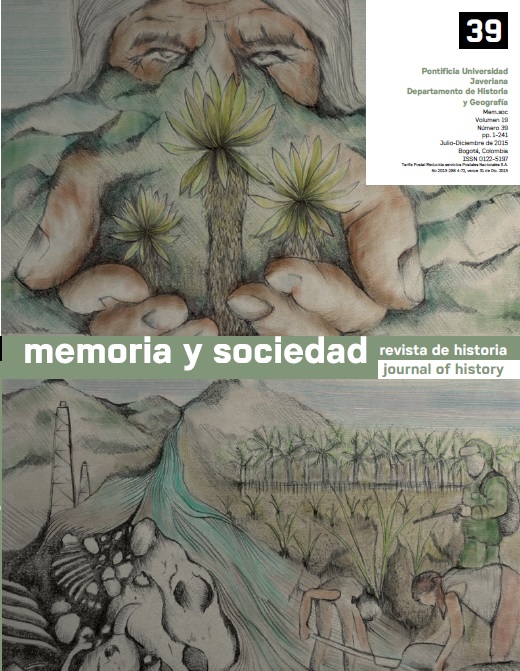Resumen
El artículo reflexiona en clave histórica y etnográfica sobre algunas fricciones y articulaciones entre agroindustria azucarera y finca tradicional en el norte plano del departamento del Cauca desde mediados del siglo xx hasta hoy. La perspectiva histórica permite rastrear la consolidación del modelo agroindustrialazucarero en la zona. La lectura etnográfica describe, desde las narrativas de los pobladores, algunos de los conflictos socioambientales que este modelo genera en la finca tradicional. Ambas claves revelan cómo ciertos recursos y
naturalezas son gobernados e intervenidos por múltiples actores y lógicas. El artículo es un resultado parcial del trabajo de campo desarrollado en algunas veredas de los municipios de Villa Rica y Padilla, entre junio y agosto de
2013, y abril y julio de 2014. También es producto de la revisión de literatura especializada sobre conflictividad socioambiental desde el enfoque de la ecología política.
La revista Memoria y Sociedad se encuentra registrada bajo la licencia Creative Commons Reconocimiento 4.0 Internacional. Por lo tanto, esta obra se puede reproducir, distribuir y comunicar públicamente en formato digital, siempre que se reconozca el nombre de los autores y a la Pontificia Universidad Javeriana. Se permite citar, adaptar, transformar, autoarchivar, republicar y crear a partir del material, para cualquier finalidad (incluso comercial), siempre que se reconozca adecuadamente la autoría, se proporcione un enlace a la obra original y se indique si se han realizado cambios. La Pontificia Universidad Javeriana no retiene los derechos sobre las obras publicadas y los contenidos son responsabilidad exclusiva de los autores, quienes conservan sus derechos morales, intelectuales, de privacidad y publicidad.
El aval sobre la intervención de la obra (revisión, corrección de estilo, traducción, diagramación) y su posterior divulgación se otorga mediante una licencia de uso y no a través de una cesión de derechos, lo que representa que la revista y la Pontificia Universidad Javeriana se eximen de cualquier responsabilidad que se pueda derivar de una mala práctica ética por parte de los autores. En consecuencia de la protección brindada por la licencia de uso, la revista no se encuentra en la obligación de publicar retractaciones o modificar la información ya publicada, a no ser que la errata surja del proceso de gestión editorial. La publicación de contenidos en esta revista no representa regalías para los contribuyentes.


